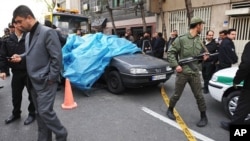Iranian media say a bomb blast in Tehran has killed a university professor who also worked as a scientist on Iran's nuclear program.
The Fars news agency said two unidentified people on a motorcycle planted the bomb under the car of Mostafa Ahmadi Roshan, killing him and his driver Wednesday. The report said a passerby was wounded by the blast in the northern part of the capital.
In statements, Iran blamed the attack on Israel and the United States. Iran's vice president, Mohammad Reza Rahimi, told state TV that the incident will not stop the country from advancing its nuclear activities.
In response, the White House said it "had absolutely nothing to do'' with the blast that killed Roshan. White House spokesman Tommy Vietor said the U.S. strongly condemns the attack and all acts of violence.
In a joint press conference in Washington with the Qatari foreign minister, Hillary Clinton again denied U.S. involvement.
"I want to categorically deny any United States involvement in any kind of act of violence inside Iran," said Clinton.
Iran's Fars agency said the 32-year-old Roshan supervised a department at the Natanz nuclear facility, Iran's main enrichment site. Iran has been enriching uranium to relatively low levels at the above-ground site.
Israel also denied responsibility for the attack. But on Tuesday, Israeli military chief Lieutenant General Benny Gantaz told parliamentarians that 2012 would be a "critical year" for Iran because things would happen to the country in an unnatural way.
The attack comes a day after Iranian officials confirmed that a new underground complex has started refining uranium, and diplomats with ties to the U.N. nuclear agency say the work is being done at a much higher lever of purity.
Attackers have killed or wounded several Iranian nuclear scientists in recent years, including blasts in late 2010 that state media also attributed to bombs placed on cars by motorcyclists.
The United Nations Security Council has imposed four sets of sanctions on Iran for refusing to stop enrichment work, which has civilian and military uses. Later this month, the European Union will discuss a possible oil export embargo to further pressure Iran.
Iran is now threatening to close the Strait of Hormuz, a vital waterway for the global oil trade. Clinton said Wednesday that Iran's threat to do so is "provocative and dangerous." She urged Iran to end its "provocative behavior" and its search for nuclear weapons.
"I think it's important to recognize very clearly that the provocative rhetoric coming out of Iran in the last week has been quite concerning," said Clinton.
Western powers accuse Iran of trying to develop a nuclear weapon. Tehran says its nuclear ambitions are peaceful
Some information for this report was provided by AP, AFP and Reuters.
| Join the conversation on our social journalism site - Middle East Voices. Follow our Middle East reports on Twitter and discuss them on our Facebook page. |




